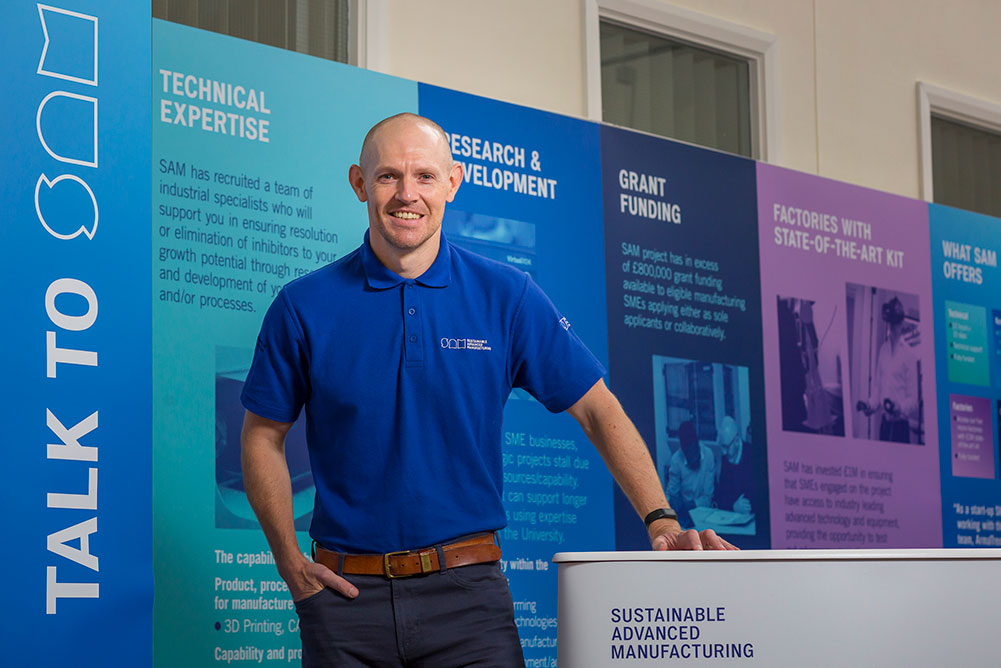A TEAM of industry experts is urging regional manufacturers to prioritise localising supply chains, to minimise the impact of future crises on the sector.
The Sustainable Advanced Manufacturing Project, a £10.9million initiative set up to provide expert advice and funding to North East SME manufacturers, issued the rallying call after witnessing first-hand how travel restrictions have affected the sector over recent months.
When national lockdowns were imposed in March last year due to the pandemic, entire supply chains were brought to a halt almost overnight, highlighting the extreme fragility of extended global supply chains, as firms the world-over were unable to import key components and materials.
Scores of small to medium sized manufacturers from across the North East have since approached the team at SAM – comprising academics from University of Sunderland and industry leading experts – for advice on securing and safeguarding their supply chains, as they look to minimise the impact of future crises.
Ken Teears, Project Manager of the SAM Project, said: “British manufacturing has been dealt blow after blow by the pandemic and establishing sustainable, localised supply chains is key to safeguarding the industry’s future.
“This was not only a challenge for the large Original Equipment Manufacturers (OEMs), SME manufacturers were also left high and dry as suppliers in mainland Europe closed temporarily and imports ceased.
“The SAM Project was able to advise companies on how they could bring production in-house and identify the manufacturing equipment required to do so.
“Companies saw that, while the unit price of making components in-house was slightly higher, the reduced risk, increased resilience and ability for staff to move onto this equipment if supply chains were disrupted again, meant they were good investments to make.
“Over the past 40 years we have seen a huge shift in the number of western manufacturers setting up facilities and sourcing parts from suppliers in low-wage economies, while failing to heed the advice of the many industry-experts and academics urging companies to establish more localised, sustainable supply chains.
“While there is no hiding from the fact that the production of materials and parts overseas can be – at times – significantly cheaper for manufacturers, the pandemic acted as a stark reminder that the ever-growing trend of manufacturers relying upon imports can also be hugely damaging to the industry’s supply chains.
“Jaguar Land Rover was a great example of this. When Chinese factories and ports were forced to close in February last year due to the pandemic, the automotive giant’s global supply chain almost ground to a halt and the company made headlines the world-over after being forced to fly-in vital components via suitcases.”
Another example was the UK’s reliance upon imported PPE, the majority of which failed to meet the standards set by Public Health England (PHE) and forced a valiant effort from UK manufacturers to diversify and begin producing PPE of their own to support the fight against the virus.
Within weeks, millions of items of PPE were produced by UK manufacturers – many of which were from the North East – meeting the highest of industry standards and ensuring the safety of our key workers.
As well as quality and economic benefits, the reshoring of manufacturing and localising of supply chains also has huge environmental advantages, helping companies slash their carbon footprint and support the UK’s fight to cap greenhouse emissions.
“Many materials and parts are transported halfway around the world before the final product is even sold.” Teears said. “By sourcing goods locally, we can effectively eradicate the need for unnecessary transport, helping firms reduce their carbon footprint and providing a huge shot in the arm to their local economies.”
The SAM Project was launched in 2018 in a bid to help businesses become more productive and sustainable by supporting projects that enhance their products, processes and technology.
Since then, the programme – which was due to end in December 2020 – has proved a huge success, providing £800,000 in matched-funding – as well as practical and research support to over 200 SMEs across the region – and is set to continue supporting the sector after securing a further £6 million, taking it to June 2023.
“If we can encourage more manufacturers to source parts locally, bringing production back to the North East that was previously outsourced and/or re-shore a larger proportion of their components, then this will prove a huge boost to the region and the resilience of the sector going forward,” Teears added.
“Since the outbreak of the pandemic, manufacturers of all kinds have contacted us for support and we have witnessed lots of companies looking to think local and make their supply chains more sustainable.
“If we can be certain of one thing as we look to 2021, it’s that there will undoubtedly be more challenges ahead for the sector as we look to bounce back from the pandemic and adjust to the new trading conditions brought about by Brexit.
“However it’s important to remember that support is available for those affected, from both the SAM Project and other programmes in the region, whom we work closely with, and we’d urge any company seeking advice and guidance to contact us for support and guidance.”
For more information on the SAM Project, visit: https://samprojectuos.co.uk/

